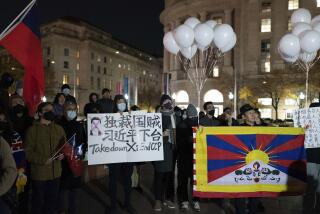Beijing Outlines Policy to Stay on Socialist Path : China: Premier Li, opening a legislative session, vows to ‘stand rock firm’ despite changes in Europe.
- Share via
BEIJING — Premier Li Peng, in a speech summarizing Beijing’s response to Soviet Bloc liberalization and domestic demands for democracy, declared Tuesday that the Chinese Communist Party will never allow socialism to be overthrown.
“Regardless of whatever stormy waves appear on the international scene, socialist China will stand rock firm in the East,” Li said, opening the annual session of China’s legislature, the National People’s Congress.
Li outlined a program of harsh political and ideological controls, combined with economic policies that emphasize central planning but preserve some role for market forces. His overall focus was on political, social and economic stability.
“If we did not keep to socialism, but instead, as some people advocate, turned back to take the capitalist road, a wide gap between the rich and the poor and a polarization of classes would inevitably arise,” Li declared. “The overwhelming majority of people would sink into poverty, and social unrest would prevail for a long time to come.
“Fraud, degeneration and crime, inherent in a society of exploiting classes, would spread unchecked. Under such circumstances, economic development would be out of the question, and the country could not be truly independent. Instead, it would only be reduced to a dependency of the developed capitalist countries.”
To prevent this, Li told the 2,705 delegates assembled in the Great Hall of the People, “we must intensify dictatorship by the socialist state apparatus.”
Law enforcement agencies must “be on the alert to promptly crush infiltration and subversion attempted by foreign and overseas hostile forces and crack down on all sabotage by hostile elements at home,” he said.
Schools, which had become centers of the liberal thinking that ultimately led to last spring’s massive pro-democracy protests, now must emphasize political indoctrination and socialist morality, Li said.
“Universities and colleges should stress education in Marxism-Leninism and Mao Tse-tung Thought, and teach students to follow the socialist road, learn from the masses and serve the people,” Li said. “Primary and middle school authorities should see to it that their pupils are educated, in ways appropriate to their age levels, in patriotism, collectivism, socialism, communism, China’s actual conditions and the need to take part in labor.”
Li stressed that the purpose of China’s decade-old reform program is not to transform the nation into a capitalist society but rather to make socialism work better.
In one of the clearest summaries yet offered by the current Chinese leadership of its long-term economic strategy, Li said that central authorities intend to make permanent use of three main methods of regulating China’s economy:
Mandatory central planning, applied mainly to large and medium-sized state-owned factories.
“Guidance,” exercised through economic policies that encourage or discourage certain types of development. This will be aimed primarily at enterprises run under the supervision of city and rural governments.
The free market, within which private and wholly foreign-owned enterprises will operate.
Li described this as a “planned economy” making use of “market regulation.” In an indirect acknowledgment that some critics view this as an unworkable formula, Li declared that these features “are not mutually exclusive and the two do not contradict each other.”
Li said that an 18-month-old economic austerity program has succeeded in slashing inflation but now has brought China to the edge of recession, with “excessive stockpiles of products” and “an increased number of enterprises running at half capacity or brought to a standstill.”
To cope with this, Li said, the government will ease controls on credit, increase investment in key construction projects, build more urban housing and provide relief to unemployed rural laborers by putting them to work on water-conservation projects and highway construction.
Speaking on international issues, Li expressed China’s unease with the changes sweeping Eastern Europe and the Soviet Union, declaring that “diverse forces . . . are realigning and regrouping, . . . thus bringing greater unrest and turbulence to the world.”
Li expressed satisfaction, however, that China and the Soviet Union “have broadened contacts in all fields” since the normalization of Sino-Soviet relations last May.
“As a socialist country, China is naturally concerned about the drastic political changes that have taken place in Eastern Europe,” Li said. “However, we never interfere in the internal affairs of other countries. . . . We hope to maintain normal, friendly relations with East European countries.”
Li said that since last June, relations with the United States and “some other Western countries” have suffered because of “the sanctions and multifaceted pressures imposed . . . by a few countries, and their interference in China’s internal affairs.”
But recent months have seen “a turn for the better” in relations with some Western countries “that have realized the importance of restoring and maintaining normal ties with China,” he said, expressing hope for this trend to continue.
More to Read
Sign up for Essential California
The most important California stories and recommendations in your inbox every morning.
You may occasionally receive promotional content from the Los Angeles Times.













